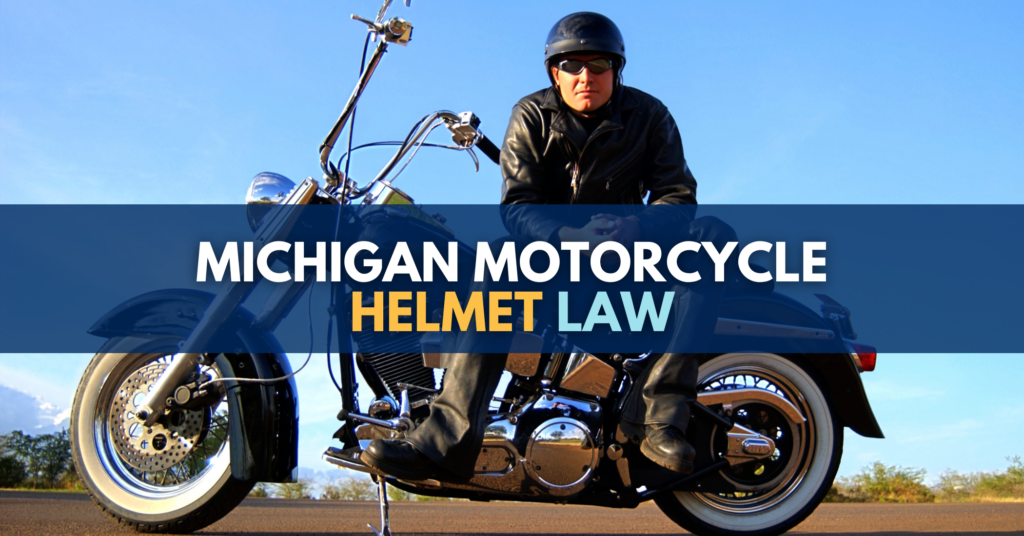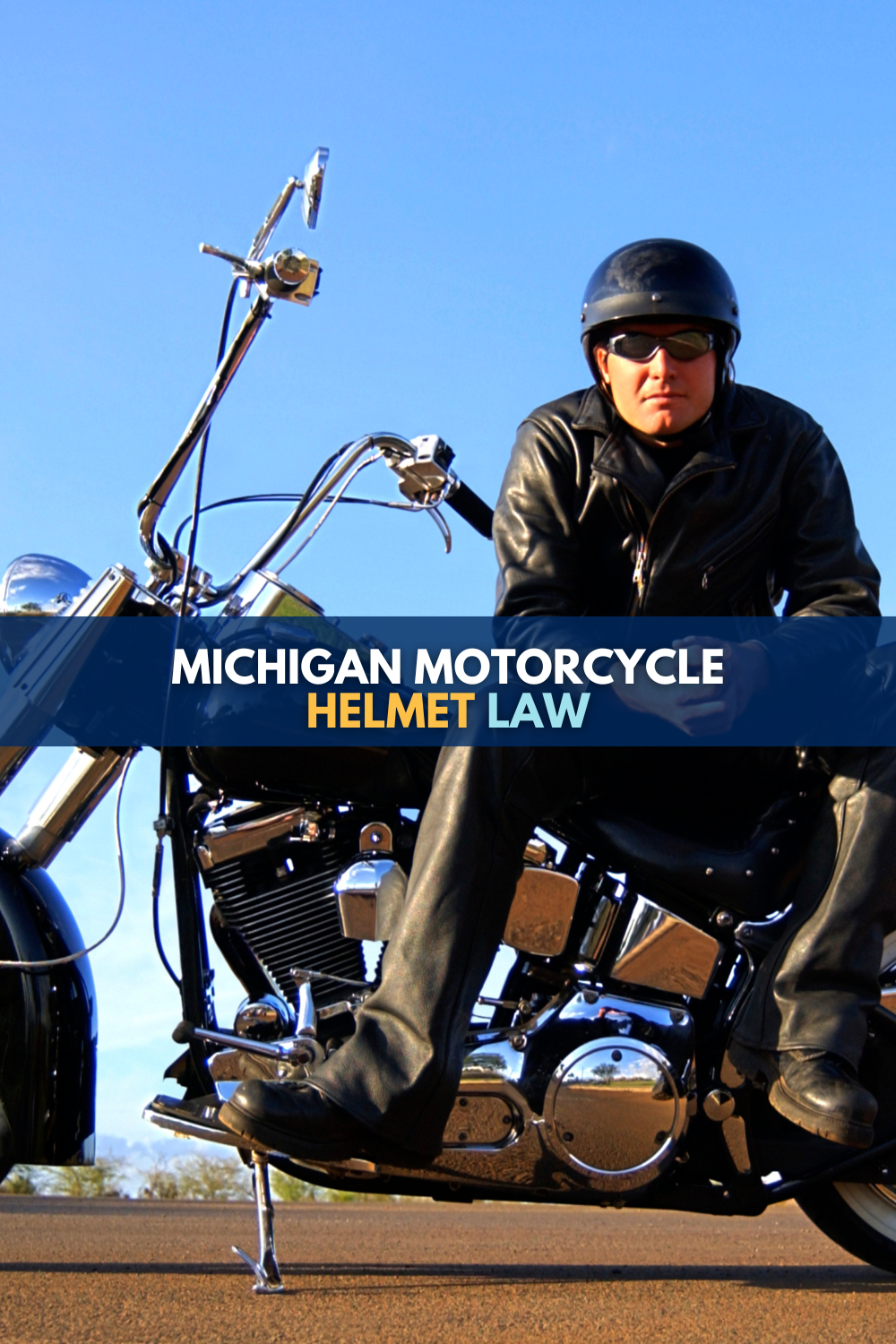Michigan Motorcycle Helmet Law: What Riders Need To Know

What is the Michigan motorcycle helmet law?
The Michigan motorcycle helmet law generally requires operators and riders to wear a crash helmet on their head. However, operators and riders who are 21 or over can go without a helmet if insurance and licensing requirements are met. Anyone under 21 who operates or rides a motorcycle must wear a helmet.
Does Michigan have a motorcycle helmet law?
Michigan does have a motorcycle helmet law and it generally requires that both rider and passengers under the age of 21 must wear a helmet. However, if certain licensing and insurance requirements are met, then operators and riders who are 21 years of age or older are not required to wear a crash helmet.
When protective headgear is required by the Michigan motorcycle helmet law
In Michigan, the motorcycle cycle helmet law general rule is that a motorcyclist – whether he or she is “operating or riding” – must “wear a crash helmet on his or her head.” (MCL 257.658(4))
When an operator is NOT required to wear protective headgear under the Michigan motorcycle helmet law
If an operator is 21 years of age or older, then he or she can operate a bike without wearing “a crash helmet on his or head” so long as the following requirements are met:
- “[H]e or she has had a motorcycle endorsement on his or her operator’s or chauffeur’s license for not less than 2 years or the person passes a motorcycle safety course . . .” (MCL 257.658(5)(a))
- He or she has motorcycle insurance that provides “first-party medical benefits” which are “payable in the event that he or she is involved in a motorcycle accident.” (MCL 257.658(5)(c))
- The operator must have first-party medical benefits insurance with a minimum limit of $20,000 if there is no rider, but a minimum limit of $20,000 “per person per occurrence” if there is a rider – but if the rider has his or her own first-party medical benefits coverage, then the operator need only have $20,000 in coverage. (MCL 257.658(5)(c)(i) and (ii))
When a rider is NOT required to wear protective headgear under the Michigan motorcycle helmet law
If a rider is 21 years of age or older, then he or she can ride on a bike without wearing “a crash helmet on his or head” so long as one of the following requirements are met:
• He or she has at least $20,000 in insurance coverage that provides “first-party medical benefits” which are “payable in the event that he or she is involved in a motorcycle accident.” (MCL 257.658(5)(b) and (c))
• The operator’s “first-party medical benefits” insurance coverage has a minimum limit of $20,000 “per person per occurrence.” (MCL 257.658(5)(b) and (c))
Penalty for violating the Michigan motorcycle helmet law
Motorcyclists who violate the helmet law will deemed “responsible for a civil infraction.” (MCL 257.656(1)) However, no points will go on the motorcyclist’s driver’s license. (MCL 257.320a(2))
Additionally, violation of the Michigan motorcycle helmet law will not disqualify an otherwise eligible motorcyclist from receiving No-Fault benefits. (See MCL 500.3113(b))
Repeal of the law
For approximately 40 years prior to 2012, state law required all motorcyclists – operators and riders – regardless of age and insurance coverage to wear crash helmets “on his or her head.”
On March 24, 2011, a bill was introduced to repeal the Michigan motorcycle helmet law.
While the bill was being considered by lawmakers, the House Fiscal Agency reported on the reason behind the proposed repeal of the helmet law:
- “[P]roponents say, the easing of the helmet requirement will have a positive effect on the state’s economy. The current law discourages out-of-state motorcyclists from traveling to Michigan. Changes to the state’s helmet laws are likely to increase tourism spending, as well as increase the sales of vehicles and accessories.”
As for the dangers of the repeal, the House Fiscal Agency also reported:
- “Insurance industry representatives in previous sessions have testified that an unhelmeted rider is 40 percent more likely to suffer a fatal head injury compared to a rider with a helmet and helmets are 67 percent effective in preventing brain injuries (citing National Highway Traffic Safety Administration statistics). They say that motorcyclists impose disproportionate costs on the state’s No-Fault insurance system, particularly the Michigan Catastrophic Claims Association.”
- “Hospital officials have said that an unhelmeted rider is 37 percent more likely to need ambulance services, be admitted to a hospital as an inpatient, have higher hospital costs, need neurosurgery, intensive care, and rehabilitation, be permanently impaired, and need long-term care.”
(Source: House Fiscal Agency, Legislative Analysis, Senate Bill 291 (Enacted as Public Act 98 of 2012), 11/1/2011)
Ultimately, the Legislature passed the repeal of the law and the governor approved it.
Enacted as Public Act 98 of 2012, the repeal of the Michigan motorcycle helmet law took effect on April 13, 2012.
Can protective headgear save lives?
NHTSA estimates that protective head gear saved the lives 1,872 of motorcyclists nationwide in 2017 and could have saved 749 more if all motorcyclists had been wearing helmets.
Additionally, NHTSA reports that protective headgear saved 46 lives in Michigan in 2017 and could have saved 27 if there had been 100% helmet use by all motorcyclists.
(Sources: NHTSA, “Traffic Safety Facts – Motorcycles – 2017 Data,” published August 2019; NHTSA, “Traffic Safety Facts – Lives and Costs Saved by Motorcycle Helmets, 2017” – published December 2019)[Note: Data for 2017 is the most current that is available]
Wear goggles even if no helmet
Any time that you are operating your motor bike on a public highway in Michigan and you’re traveling at more than 35 mph, you must wear shatter-proof goggles, eyeglasses or a face shield to “protect [your] eyes against insects, other airborne material, and highway surface water and debris.” (MCL 257.708a)
This rule applies if your motor bike is not equipped with a windshield. It also applies whether you are wearing a crash helmet or not.
Injured in a motrocycle accident in Michigan? Call the attorneys at Michigan Auto Law
If you have been injured in a motorcycle accident in Michigan, call now (855) 781-7747 for a free consultation with one of our experienced motorcycle accident lawyers. There is no cost or obligation. You can also visit our contact page or use the chat feature on our website.
Michigan Auto Law is Michigan’s largest and most successful law firm that specializes exclusively in helping people who have been injured in auto accidents.
Our secret? Our attorneys deliberately handle fewer cases than other personal injury law firms. This allows us to focus more time and attention on our cases.
Unlike other law firms, our attorneys are never too busy to promptly return phone calls and answer questions.
We have more than 2,000 5-Star Reviews that reflect this care and attention to detail.
More importantly, this client-focused approach leads to better and faster settlements for our clients. Michigan Auto Law has recovered more million-dollar settlements and trial verdicts for motor vehicle accidents than any other lawyer or law firm in Michigan. We’ve also recovered the highest ever reported truck accident and car accident settlement in the state.
Call now so we can start making a real difference for you.









